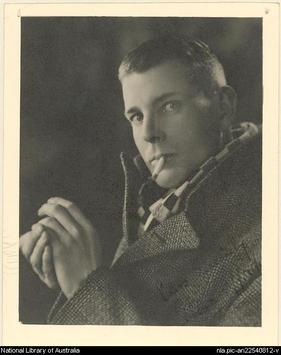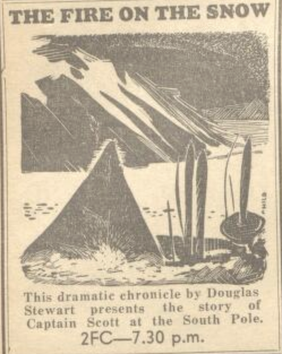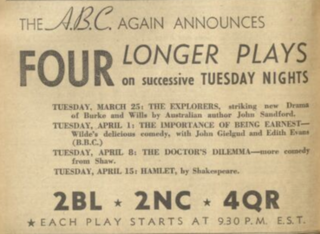Related Research Articles
Ronald Grant Taylor was an English-Australian actor best known as the abrasive General Henderson in the Gerry Anderson science fiction series UFO and for his lead role in Forty Thousand Horsemen (1940).

Malcolm R. Afford known as Max Afford, was an Australian playwright and novelist.

Muriel Myee Steinbeck was an Australian actress who worked extensively in radio, theatre, television and film. She is best known for her performance as the wife of Sir Charles Kingsford Smith in Smithy (1946) and for playing the lead role in Autumn Affair (1958–59), Australia's first television serial.
Edmund Piers Barclay was an English-Australian writer known for his work in radio drama. Radio historian Richard Lane called him "Australian radio's first great writer and, many would say, Australian radio's greatest playwright ever." Frank Clelow, director of ABC Drama, called him "one of the outstanding radio dramatists of the world, with a remarkable technical skill and ability to use the fade-back without confusing the audience."

The Fire on the Snow is a 1941 Australian verse play by Douglas Stewart about the Terra Nova Expedition to Antarctica by Robert Falcon Scott. It premiered on ABC radio on 6 June 1941 to great acclaim and inspired a series of Australian verse dramas on ABC radio.

Lady in Danger was a play by Australian writer Max Afford. It was one of the few Australian plays to be produced on Broadway. It was also adapted for radio and television.

The Invisible Circus is a 1946 Australian stage play by Sumner Locke Elliott set in the world of commercial radio drama, a field that Elliott knew well from many years writing for George Edwards. Elliott is represented in two characters, the idealistic Brad and the more jaded Mark.
Ned Kelly is a 1942 radio play by Douglas Stewart about the outlaw Ned Kelly. It was later adapted into a stage play which was in turn adapted for television.
Sons of the Morning is a 1945 verse drama Australian play by Catherine Duncan. It was originally written for radio.
Portrait of a Gentleman is a 1948 Australian stage play by George Farwell about Thomas Griffiths Wainewright.
Stockade is a 1942 radio play by Richard Lane who regarded it as one of his most significant works. It is a verse drama about the Eureka Rebellion. It tells the story though Bridget Shannahan who was on Bakery during the Stockade period. She was a real person, grandmother to Lane's then-wife.
Webs of Our Weaving is a 1945 Australian radio play by Musette Morell. It is one of her most highly regarded radio plays.

The Explorers is a 1952 Australian radio play about the Burke and Wills expedition by John Sandford. It was Sandford's first play.
With Wings as Eagles is a 1943 Australian radio play verse drama by Edmund Barclay and Joy Hollyer about three airmen in World War Two.
Buke and Wills is a 1949 Australian radio play by Colin Thiele about the Burke and Wills expedition.
The Earthquake Shakes the Land is an Australian radio play in verse by Douglas Stewart. It concerns the Invasion of the Waikato in the New Zealand Wars. It was a companion piece to Stewart's The Golden Lover.
The Golden Lover is a 1943 Australian verse drama by Douglas Stewart. It was based on an ancient Maori legend. Stewart was from New Zealand.
The Unmapped Land is a 1943 Australian verse drama play for radio by Elisabeth Lambert. It was entered in a verse drama competition and did not win but was purchased and produced by the ABC.
It Has Happened Before is a 1943 Australian verse drama written for radio by Dorothy Blewett. It aired in July and was repeated in September.
Peter Finch is an Australian actor whose career spanned more than forty years.
References
- ↑ "Thursday, May 27", ABC Weekly, Sydney, 5 (21), 22 May 1943, retrieved 3 November 2023– via Trove
- ↑ "RadioPlay". Western Mail (Western Australia) . Vol. 60, no. 3, 096. Western Australia. 13 July 1945. p. 22. Retrieved 2 September 2023– via National Library of Australia.
- ↑ Moore, T. Inglis (Tom Inglis,); Mant, Gilbert. Grim glory; Australia. Australian Army. Australian Imperial Force (1939-1945) (1945), We're going through : a radio verse play of the A.I.F., Angus and Robertson, retrieved 2 September 2023
{{citation}}: CS1 maint: multiple names: authors list (link) CS1 maint: numeric names: authors list (link) - ↑ Page 102 of Kenneth Stanley Inglis; Brazier, Jan (1983), This is the ABC the Australian Broadcasting Commission, 1932-1983, Carlton, Vic Melbourne University Press, ISBN 978-0-522-84258-6
- ↑ "Romantic Comedy In Verse", ABC Weekly, Sydney, 5 (4), 23 January 1943, retrieved 3 November 2023– via Trove
- ↑ "Ten new verse plays", ABC Weekly, Sydney, 5 (12), 20 March 1943, retrieved 3 November 2023– via Trove
- ↑ "No title", ABC Weekly, Sydney, 6 (4), 22 January 1944, retrieved 3 November 2023– via Trove
- ↑ "_ Verse Play On War In The Jungle". The Advertiser (Adelaide) . Vol. 88, no. 27070. South Australia. 7 July 1945. p. 4. Retrieved 2 September 2023– via National Library of Australia.
- ↑ "Play About Malaya", The Bulletin., Sydney, N.S.W: John Haynes and J.F. Archibald, 66 (3415), 25 Jul 1945, retrieved 3 November 2023– via Trove
- ↑ Harris, Max.; Reed, John.; Kerr, D. B.; University of Adelaide. Arts Association., "The Current Literary Scene", Angry Penguins, Adelaide University Arts Association (1945), retrieved 3 November 2023– via Trove
- ↑ "Drama Chronicle", Meanjin Papers, Brisbane: C. Christesen, 4 (3), Spring 1945, retrieved 2 September 2023– via Trove